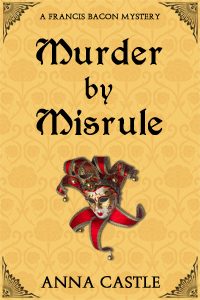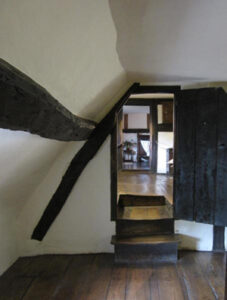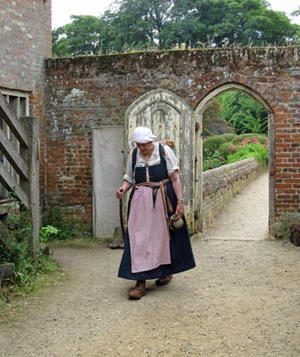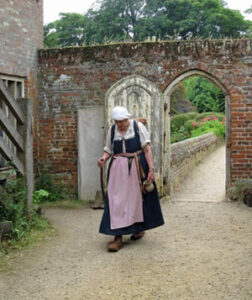
Historical novelist Anna Castle shares her experience of managing travel expenses
Running a successful effective author business includes setting allowable costs against your tax bill. Whatever kind of books you self-publish, there may be times when you need to travel for the sake of writing research. Today seasoned author and keen traveller Anna Castle takes us through how to keep good track of your travel expenses and what may or may not be allowable.
Nice Work If You Can Get It
“The wages of sin are death, but by the time taxes are taken out, it’s just sort of a tired feeling.” – Dan Bennett
When I started writing Murder by Misrule, the first in my Francis Bacon mystery series, I was managing a grant-funded project at a big state university. I learned to keep travel records that would satisfy state and federal auditors – excellent training for a travelling novelist.

Anna Castle's first Francis Bacon mystery
I started deducting expenses with my first book-related trip to England in 2010, earning a large enough refund to pay for my first website. I was pitching agents back then, so I had rejection letters to prove my intent to make money. (Ergo, not a hobby.) Documented progress toward publication along with a business plan is probably good enough for an indie.
Big giant caveat: I am not now, nor have I ever been, a tax accountant or attorney. Take my advice with a heaping helping of salt!
Maintain a Clear Separation
It’s essential to draw a sharp line between travel for work (writing research) and travel for fun. I ask myself, could I charge this to my grant account if I were writing this novel for the National Science Foundation? When in doubt, throw that receipt out.
I do my book research solo, which lets keep my head in my stories and makes accounting easier. If you travel with a pal, you’ll have to do more math. But even if your partner is a brilliant Watson, you can’t deduct their expenses. Also don’t deduct odd bits of casual semi-research when you’re really traveling for pleasure. I was in Paris last month and I spent a morning loping around taking pictures of Christopher Marlowe’s city, but I won’t deduct my breakfast that day.
Keep It Together
Francis Bacon wrote in Of Travel, “Let diaries, therefore, be brought in use.”

Inside Anne Hathaway's cottage, Stratford-upon-Avon – watch your head!
A diary helps you remember what you did and learned each day; if worst comes to worst, you can show it to the auditor to support your claim that spending an afternoon watching The Tempest at the Globe Theater was totally work-related. (How much do I love this job?) Being a well-trained nerd, I type up my notes up in the evening while I’m recharging gadgets and uploading photographs.
Keep all your receipts, even itty-bitty museum tickets. Credit card records are also good. Some say a running expense log is a valid substitute, but my travel office wouldn’t accept it. If I have no receipt, I don’t deduct that expense. I bring a big envelope to keep my receipts in. When I get home, I scan them and archive pdf copies as well as the originals. (At the university, we had to tape them to pieces of printer paper and then scan them.)
Sort It All Out
I deduct five categories of expenses: lodging, meals, transport, entrance fees, and books. The first three correspond to lines on the tax form. Entrance fees go under Research (technically Other). This could include helicopter pilot lessons or bungy-jumping, if Francis Bacon had done those things. It definitely includes theater tickets (mine only) to plays by Shakespeare or Marlowe. On research trips, I always the buy the booklet for the places I visit. Their gorgeous photographs are better for reference. Besides, I deduct every book I buy anywhere.
As one of my mentors once said, “Anna, how can you read a book without it having an impact on your writing?”
These five categories result from negotiating between what I do and TurboTax. I’ve defined categories in Quicken for all my writing stuff which makes things easier. Your mileage will vary. If you have an accountant, ask them for tips.
My spreadsheet has two columns for each category: pounds and dollars. The university required us to convert currency at the rate of the day the expense occurred. (Yes, really!) They use Oanda, which I also use to convert royalties. Having been trained by fearsome department secretaries, I sit down and do this the day after I get home. Discipline, my friends!
Meals include the bags of goodies I pick up at Marks & Spencer in the tube station and the ice cream I buy in the stately home gift shop. Gotta keep your strength up! I don’t drink, but you might think twice before deducting alcohol. My university wouldn’t allow it.
Because It's Worth It!
Travelling with a book in your head is almost as much fun as dreaming up the story in the first place.
And book research gets you off the beaten path like nothing else. I’ve walked the same grass road in Hatfield Forest where Marlowe probably walked going from Canterbury to Cambridge — under the jets streaming into Stansted Airport, but still, a bit of living medieval forest, with a cool hazel thicket to shade my lunch with a serenade of blackbirds. All that, and a healthy tax return to boot!
OVER TO YOU Do you have other advice to add to Anna Castle's top tips? What works best for you on your research trips? We'd love to hear about them!
#Indieauthors - one way to make more money from your #selfpub books: make sure you set allowable research & travel expenses against tax! Let @annacastl talk you through her top tips here. Share on XMORE GREAT POSTS ABOUT TRAVEL AND RESEARCH HERE
From the ALLi Author Advice Center Archive






Hi Anna,
Excellent information.One question I have that you might know the answer to – is there a cap on research-related travel expenses? In particular, do you have to earn a certain amount from book sales in order to deduct all allowable travel expenses?
Thanks!
Derek
Bookmarking the HELL out of this post. Thank you so much Anna – it’s one of those cases when I’m thinking “I wonder where I could find this type of information” and then it just appears!
Now, how do I split the fun vs research parts of my next trip to Iceland when I am having so much fun doing the research… 🙂